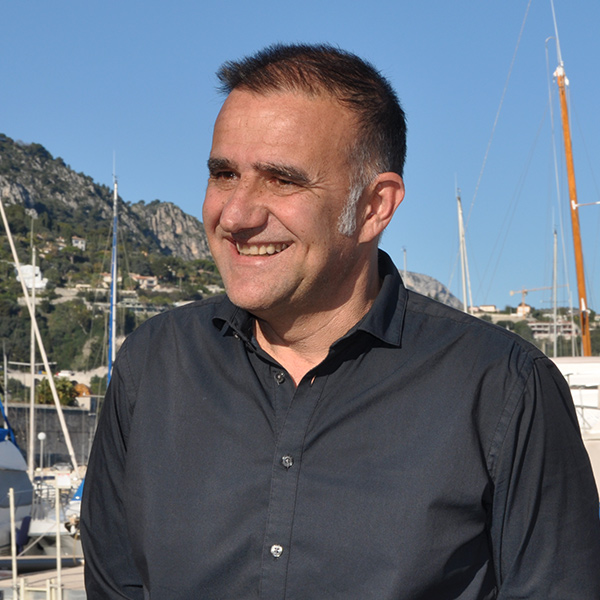RESTRICTED ACCESS
Team
INTERVIEW OF Hervé CLAUSTRE
during SOCLIM kickoff ....
Hervé CLAUSTRE
PRESENTATION
Hervé Claustre got his PhD in 1987 and, after a post-doc at Plymouth Marine Laboratory, became CNRS Research Associate (1990) and then CNRS senior scientist at LOV. His research activities can be summarized as follows: To develop interdisciplinary approaches at the frontiers of marine biology, chemistry and optics for the study and understanding of biogeochemical processes ranging from the small to the global scale to address the variability of stocks and fluxes of matter in the upper ocean in the context of global change. Within this broad topic, his scientific contributions can be classified in three main groups.
- (1) the development of a research field based on HPLC techniques for measuring phytoplankton pigments and their application through chemotaxinomic investigations (pigments used as bio-markers of phytoplankton communities)
- (2) the development of new observational approaches at the interface of marine optics (theoretical and experimental, in situ and remote sensing) and biogeochemistry.
- (3) Since 2003, and as a natural extension of his work, Hervé Claustre is pursuing investigation of biogeochemical processes at presently unresolved scales or in poorly observed oceanic areas. For that purpose, he dedicates a large part of his effort to develop new observational techniques based on gliders and profiling floats. (http://www.oao.obs-vlfr.fr)
SELECTED PUBLICATIONS RELEVANT TO THIS PROPOSAL
Hervé Claustre has published more than 100 papers, which have been cited more than 5000 times. His h-index is 39.
- Claustre, H., Antoine, D., Boehme, L., Boss, E., D'Ortenzio, F., Fanton D’Andon, O., Guinet, C., Gruber, N., Handegard, N.O., Hood, M., Johnson, K., Lampitt, R., LeTraon, P.-Y., Lequéré, C., Lewis, M., Perry, M.-J., Platt, T., Roemmich, D., Testor, P., Sathyendranath, S., Send, U., & Yoder, J. (2010). "Guidelines Towards an Integrated Ocean Observation System for Ecosystems and Biogeochemical Cycles" in Proceedings of OceanObs’09: Sustained Ocean Observations and Information for Society (Vol. 1), Venice, Italy, 21-25 September 2009, Hall, J., Harrison, D.E. & Stammer, D., Eds., ESA Publication WPP-306, doi:10.5270/OceanObs09.pp.14
- Xing, X., Morel, A., Claustre, H., Antoine, D., D'Ortenzio, F., Poteau, A., Mignot, A. (2011). Combined processing and mutual interpretation of radiometry and fluorimetry from autonomous profiling Bio-Argo Floats. The retrieval of Chlorophyll a, Journal of Geophysical Research, 116, C06020, doi:10.1029/2010JC006899.
- Guinet, C., X. Xing, E. Walker, P. Monestiez, S. Marchand, B. Picard, T. Jaud, M. Authier, C. Cotté, A. C. Dragon, E. Diamond, D. Antoine, P. Lovell, S. Blain, F. D'Ortenzio, and H. Claustre (2013). Calibration procedures and first data set of Southern Ocean chlorophyll-a profiles collected by elephant seal equipped with a newly developed CTD-fluorescence tags. Earth System Science Data, 5, 15–29, 2013 www.earth-syst-sci-data.net/5/15/2013/ doi:10.5194/essd-5-15-2013
- Johnson, K.S., Berelson, W.M., Boss, E.S., Chase, Z., Claustre, H., Emerson, S.R., Gruber, N., Körtzinger, A., Perry, M.J. and S.C. Riser (2009). Observing biogeochemical cycles at global scales with profiling floats and gliders: prospects for a global array. Oceanography, 22(3), 216-225.
SELECTED ACTIVITIES / ANIMATION / AWARDS
2000‐2003: Associated editor for Journal of Geophysical Research‐Ocean
2008: Editor of the Biogeosciences special issue (30 papers published) for the Biogeochemistry and Optics South Pacific Experiment (BIOSOPE)
1999-2005: Co-Organizer of three international HPLC intercomparison exercises (NASA funds)
2008 AGU‐ASLO‐TOS meeting, Orlando, FL. Organizing Committee
2009 US OCB Floats and Gliders Workshop, Moss Landing, CA. Steering committee
Supervision 13 students and 4 post‐docs
PI of the PROSOPE (32 days, 28 scientists) and BIOSOPE (55 days, 35 scientists) cruises
CNRS Silver Medal (2005)
ERC advanced grant (2010‐2014)
SYNERGISTIC ACTIVITIES
Between 2001 and 2010, Hervé Claustre was Chair of the French Scientific Committee for the Oceanic Biogeochemistry Program ands thus responsible of coordinating the yearly call topics as well as the subsequent evaluation of submitted projects.
One of his strongest wishes is to help with the progressive implementation of an international Bio-Argo program, following the model of the (exemplary) Argo program. In this context, he has served or serves in several committees. He was (2008-2010) the Chair of the “Bio-Argo” Working Group of the International Ocean Color Coordinating Group (IOCCG). Presently he is member of the scientific and technical advisory group of the Euro-Argo consortium, member of the Argo Science Team, member of the SCOR Unesco Working group “Quality Control Procedures for Oxygen and Other Biogeochemical Sensors on Floats and Gliders” and member of the international committee of the SOCOM (Southern Ocean Climate Observation and Modeling) program. He has led several sessions at international meetings (e.g. AGU/ASLO/TOS) on “new science applications” based on floats and gliders.
In 2004, Hervé Claustre was the PI of the international BIOSOPE cruise [Biogeochemistry and Optics South Pacific experiment, supported by French, European and US (NASA) agencies]. This 2-month cruise with 35 scientists onboard realized a 8000 km transect from the Marquesas Islands to Chile, crossing the unknown (desert) waters associated with the South Pacific Gyre. The BIOSOPE project focused on Ocean Optics (satellite validation), biogeochemistry and molecular biology. To date, more than 85 papers using the BIOSOPE data have been published among which a special issue in Biogeosciences (35 papers).
Within the Laboratoire d’Océanographie of Villefranche, Hervé Claustre is leading the Ocean Autonomous Observation (OAO: http://www.oao.obs-vlfr.fr), whose topics range from scientific analysis and valorization of data acquired by autonomous platforms to technological developments of new sensors (e.g. a Jelly fish camera) or platforms (e.g. the group is involved in the development of the SeaExplorer robot).
Hervé Claustre is highly concerned by outreach and science dissemination to a wider audience. In this context he is co-PI of the educational projects « Mon Océan & Moi » and « Adopt a float » which aims at increasing ocean literacy of large public and especially the youth (see: http://www.monoceanetmoi.com ). These projects are presently involving more and more scientists, engineers and students from the LOV in these outreach activities. Internationalization of “adopt a float” (by different classes of different countries) is presently one of the future targets of this project. This project has been endorsed by the International Oceanographic Committee of UNESCO.

